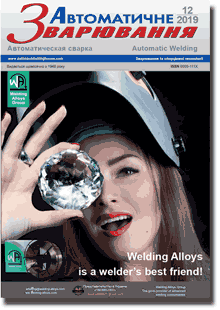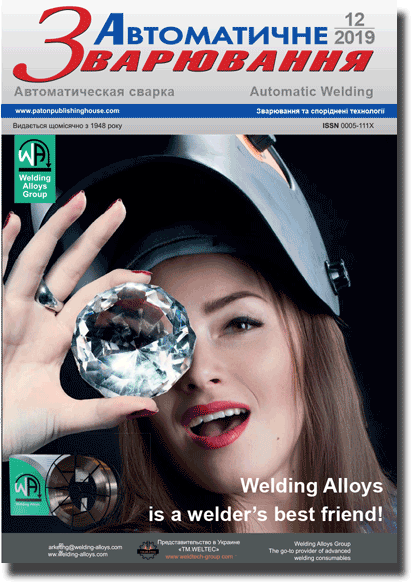| 2019 №12 (01) |
DOI of Article 10.15407/as2019.12.02 |
2019 №12 (03) |

"Avtomatychne Zvaryuvannya" (Automatic Welding), #12, 2019, pp.12-24
Processes of nonconsumable electrode welding with welding current modulation (Review). Part II. Effects of arc impact on the metal being welded
U.Boi1, I.V.Krivtsun2
1Guangdong Institute of Welding (China-Ukraine E.O.Paton Institute of Welding). 363 Chiansin Str., 510650, Guangzhou, Tianhe. E-mail: wuby@gwi.gd.cn
2E.O. Paton Electric Welding Institute of the NAS of Ukraine. 11 Kazymyr Malevych Str., 03150, Kyiv, Ukraine. E-mail: office@paton.kiev.ua
A review of studies, devoted to the processes of nonconsumable electrode inert-gas welding with welding current modulation was performed. The second part of the review is devoted to analysis of the works, dealing with the features of metal penetration (aluminium alloys, stainless steel, high-temperature nickel-chromium alloys) and weld formation in TIG welding with modulated current. 12 Ref., 16 Tabl., 19 Fig.
Keywords: arc with refractory cathode, TIG welding, welded metal, penetration, weld, welding current modulation, pulse, frequency, fill factor, amplitude
Received: 04.11.2019
Published: 17.12.2019.
References
1. Boyi, U., Krivtsun, I.V. (2019) Processes of nonconsumable electrode welding with welding current modulation (Review). Pt 1: Peculiarities of burning of nonstationary arcs with refractory cathode. The Paton Welding J., 11, 23-32. https://doi.org/10.15407/tpwj2019.11.052. Roden, W.A. (1972) High-frequency, pulsed-current GTA welding. In: Proc. of National Aerospace Engineering and Manufacturing Meeting (2-5 Oct. 1972, San Diego, California, USA). Paper 720874, 1-8.
3. Leitner, R.E., McElhinney, G.H., Pruitt, E.L. (1973) An investigation of pulsed GTA welding variables. Welding J., Res. Suppl., 9, 405-410.
4. Omar, A.A., Lundin, C.D. (1979) Pulsed plasma - pulsed GTA arcs: A study of the process variables. Ibid., 4, 97-105.
5. Saedi, H.R., Unkel, W. (1988) Arc and weld pool behavior for pulsed current GTAW. Ibid., 11, 247-255.
6. Dzelnitzki, D. (2000) Muendersbach TIG - direct-current welding with high-frequency pulses, an interesting process variant. EWM Hightec Welding GmbH. WM008801. DOC: 08.00.
7. Onuki, J., Anazawa, Y., Nihei, M. et al. (2002) Development of a new high-frequency, high-peak current power source for high constricted arc formation. Japan. J. Appl. Phys., 41, 5821-5826. https://doi.org/10.1143/JJAP.41.5821
8. Karunakaran, N., Balasubramanian,V. (2011) Effect of pulsed current on temperature distribution, weld bead profiles and characteristics of gas tungsten arc welded aluminum alloy joints. Transact. Nonferrous Met. Soc. China, 21, 278-286. https://doi.org/10.1016/S1003-6326(11)60710-3
9. Qi, B., Yang, M., Cong, B. et al. (2013) The effect of arc behavior on weld geometry by high-frequency pulse GTAW process with 0Cr18Ni9Ti stainless steel. Int. J. Adv. Manuf. Technol., 66, 1545-1553. https://doi.org/10.1007/s00170-012-4438-z
10. Yang, Z., Qi, B., Cong, B. et al. (2013) Effect of pulse frequency on weld appearance behavior by TC4 titanium alloys. Transact. China Welding Institute, 34(12), 37-40.
11. Cunha, T.V.D., Louise-Voigt, A., Bohorquez, C.E.N. (2016) Analysis of mean and RMS current welding in the pulsed TIG welding process. J. of Materials Processing Technology, 231, 449-455. https://doi.org/10.1016/j.jmatprotec.2016.01.005
12. Silva, D.C.C., Scotti, A. (2016) Using either mean or RMS values to represent current in modeling of arc welding bead geometries. Ibid., 240, 382-387. https://doi.org/10.1016/j.jmatprotec.2016.10.008
The cost of subscription/purchase order journals or individual articles
| Journal/Currency | Annual Set | 1 issue printed |
1 issue |
one article |
| TPWJ/USD | 384 $ | 32 $ | 26 $ | 13 $ |
| TPWJ/EUR | 348 € | 29 € | 24 € | 12 € |
| TPWJ/UAH | 7200 UAH | 600 UAH | 600 UAH | 280 UAH |
| AS/UAH | 1800 UAH | 300 UAH | 300 UAH | 150 UAH |
| AS/USD | 192 $ | 32 $ | 26 $ | 13 $ |
| AS/EUR | 180 € | 30 € | 25 € | 12 € |
| SEM/UAH | 1200 UAH | 300 UAH | 300 UAH | 150 UAH |
| SEM/USD | 128 $ | 32 $ | 26 $ | 13 $ |
| SEM/EUR | 120 € | 30 € | 25 € | 12 € |
| TDNK/UAH | 1200 UAH | 300 UAH | 300 UAH | 150 UAH |
| TDNK/USD | 128 $ | 32 $ | 26 $ | 13 $ |
| TDNK/EUR | 120 € | 30 € | 25 € | 15 € |
AS = «Automatic Welding» - 6 issues per year;
TPWJ = «PATON WELDING JOURNAL» - 12 issues per year;
SEM = «Electrometallurgy Today» - 4 issues per year;
TDNK = «Technical Diagnostics and Non-Destructive Testing» - 4 issues per year.





